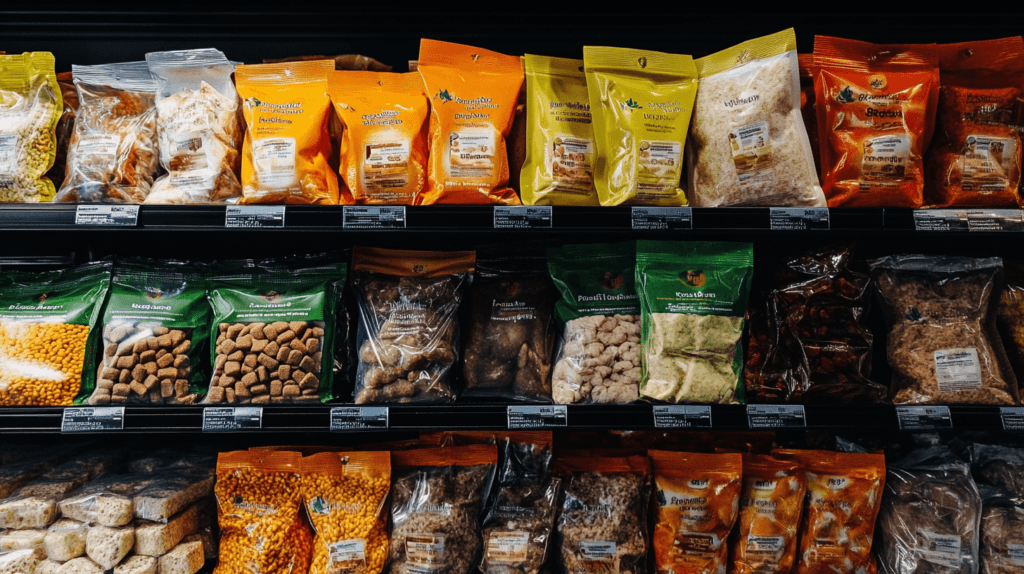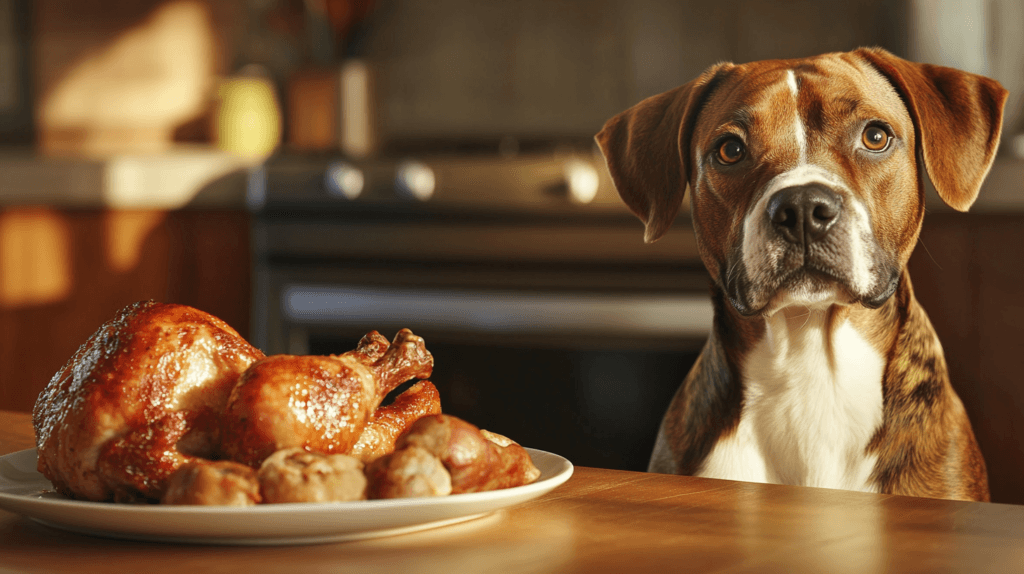Chicken is a common and nutritious protein source that many dogs enjoy, but can dogs eat chicken safely? The answer is yes, but with some important considerations. While plain, cooked chicken is generally safe and healthy for dogs, rotisserie chicken may not be the best option. It is often seasoned, cooked with oils, and may contain additives that can be harmful to your pet. To ensure your dog’s safety, it’s best to serve unseasoned, fully cooked chicken without bones or skin, as these can pose choking hazards or digestive issues.
This article explores whether rotisserie chicken is safe for dogs, the potential benefits and risks, and how to safely prepare it if you choose to share it with your canine companion. We’ll also discuss alternatives, address common concerns, and provide helpful guidelines to ensure your dog’s health and happiness.
Table of Contents
Is Rotisserie Chicken Safe for Dogs?
Dogs are naturally omnivores, and chicken is a protein-rich food that many dogs love. However, rotisserie chicken, with its seasonings and cooking process, may not always be the best option. Below, we’ll break down the nutritional content, benefits, and risks to help you make an informed decision.
Nutritional Content of Rotisserie Chicken
Rotisserie chicken is a rich source of protein, which is essential for muscle development, energy, and overall health in dogs. Additionally, it provides other nutrients such as:
- Vitamins and Minerals: Vitamin B6, niacin, phosphorus, and selenium.
- Fats: Essential fatty acids, although rotisserie chicken often has added fats that aren’t ideal for dogs.
- Calories: Depending on the preparation, it can be calorie-dense, making portion control important.
While the nutrients in chicken are beneficial, the preparation method of rotisserie chicken introduces elements that can be harmful to dogs, such as excess sodium and unhealthy fats.
Potential Benefits of Feeding Rotisserie Chicken to Dogs
If prepared correctly and in moderation, rotisserie chicken can offer some benefits, including:
- High Protein Content: Supports strong muscles and energy.
- Palatability: Many dogs find it incredibly tasty, which can encourage picky eaters.
- Convenience: It’s a ready-to-eat option when you’re short on time.
Risks Associated with Rotisserie Chicken
Despite its appeal, rotisserie chicken poses several risks:
- Seasonings and Spices: Common seasonings like garlic, onion, and certain herbs are toxic to dogs.
- Bones: Cooked chicken bones can splinter, causing choking or internal injuries.
- Sodium Levels: Rotisserie chicken often contains high sodium, which can lead to dehydration or sodium poisoning in dogs.
- Fats and Oils: Added fats can upset your dog’s stomach or contribute to weight gain and pancreatitis.
How to Safely Feed Rotisserie Chicken to Dogs
If you decide to share rotisserie chicken with your dog, it’s crucial to take precautions to ensure their safety and health. Here are essential steps for safely preparing and serving this food to your furry friend.
Removing Harmful Ingredients
Rotisserie chicken is often seasoned with spices that can harm your dog. Follow these steps to make it safe:
- Remove the Skin: The skin absorbs most of the seasoning, fats, and oils used during cooking. Peel it off completely before serving.
- Check for Garlic and Onion: Ensure there are no traces of garlic, onion, or related seasonings, as these are toxic to dogs even in small quantities.
- Rinse the Meat: If the chicken is lightly seasoned, rinsing the meat under warm water can help reduce salt and spice residues.
Serving Suggestions for Dogs
Proper preparation and serving methods can make rotisserie chicken safer and more enjoyable for your pet:
- Shred the Chicken: Remove all bones and shred the meat into small, bite-sized pieces. This prevents choking and ensures easier digestion.
- Mix with Other Foods: Combine the chicken with plain rice or steamed vegetables like carrots or green beans to create a balanced meal.
- Serve Plain: Avoid adding sauces, gravies, or additional seasonings that might upset your dog’s stomach.
Portion Control Guidelines
While rotisserie chicken can be a treat, moderation is key. Overfeeding can lead to obesity or other health issues. Follow these portion control tips:
- Small Breeds: Serve a few small pieces, roughly the size of your thumb.
- Medium to Large Breeds: Offer a handful of shredded chicken, mixed with other safe foods.
- Monitor Weight and Health: Regularly check your dog’s weight and adjust portion sizes as needed.
Rotisserie chicken should only be an occasional treat and not a regular meal replacement unless prepared specifically to meet your dog’s nutritional needs.
Alternatives to Rotisserie Chicken for Dogs

If you’re concerned about the risks of rotisserie chicken, there are plenty of safe and nutritious alternatives. Here are some options that provide similar benefits without the added risks.
Healthy Cooked Chicken Options
Plain, cooked chicken is one of the safest and most versatile protein sources for dogs. Here’s how to prepare it:
- Boiled Chicken: Cook chicken breast in plain water without any spices or oils. Shred the meat and serve it to your dog.
- Grilled Chicken: Grilling is another healthy option, but ensure there are no marinades or seasonings.
- Baked Chicken: Bake the chicken in the oven with no additional ingredients. This method retains nutrients while avoiding unhealthy fats.
Commercial Dog Food with Chicken
Many high-quality dog foods include chicken as a primary ingredient. These options are designed to provide balanced nutrition and eliminate the risks associated with human-prepared chicken:
- Dry Kibble: Look for formulas labeled “chicken as the first ingredient.”
- Wet Food: Canned dog food with shredded chicken offers a convenient and tasty alternative.
- Freeze-Dried or Dehydrated Options: These are great for maintaining the nutritional value of chicken while offering long shelf life.
Balanced Homemade Meals for Dogs
Homemade meals can include chicken as a primary protein source, combined with other healthy ingredients. Here’s a simple recipe:
- Protein: Shredded boiled chicken.
- Carbohydrates: Cooked rice or sweet potatoes.
- Vegetables: Steamed broccoli, carrots, or green beans.
- Healthy Fats: A small amount of olive oil or fish oil.
Always consult a veterinarian or pet nutritionist before switching to homemade meals to ensure proper balance.
Common Questions About Dogs and Chicken
When it comes to feeding dogs chicken, especially rotisserie chicken, dog owners often have specific concerns. Let’s address some of the most common questions to help you make informed decisions.
Can Puppies Eat Rotisserie Chicken?
Yes, puppies can eat chicken, but rotisserie chicken might not be the best choice. Here’s why:
- Sensitive Stomachs: Puppies have delicate digestive systems, and the added oils, seasonings, and fats in rotisserie chicken could cause an upset stomach.
- Risk of Choking: Cooked bones, often present in rotisserie chicken, are dangerous for puppies due to their small size and tendency to splinter.
- Better Alternatives: Boiled or plain baked chicken is a safer option for puppies. It’s gentle on their stomachs and free from harmful additives.
If you want to give rotisserie chicken to a puppy, ensure it is thoroughly de-skinned, unseasoned, and boneless.
How Often Can Dogs Eat Rotisserie Chicken?
Rotisserie chicken should only be an occasional treat rather than a regular part of your dog’s diet. Overfeeding can lead to:
- Nutritional Imbalance: While chicken is rich in protein, dogs require a balanced diet with other nutrients.
- Weight Gain: The added fats and calories in rotisserie chicken can contribute to obesity.
- Health Risks: Regular consumption of seasoned chicken may expose your dog to toxic ingredients like garlic or onion.
A general guideline is to offer rotisserie chicken no more than once a week and in small portions.
Are Rotisserie Chicken Bones Safe for Dogs?
No, rotisserie chicken bones are not safe for dogs. Cooked bones are brittle and prone to splintering, which poses serious risks, including:
- Choking Hazard: Small or sharp bone fragments can block the throat or digestive tract.
- Internal Injuries: Splintered bones can cause perforations in the stomach or intestines, leading to life-threatening conditions.
- Dental Damage: Chewing on hard bones may break your dog’s teeth.
Always ensure all bones are removed from the chicken before offering it to your dog.
FAQs
Can dogs eat store-bought rotisserie chicken?
Yes, dogs can eat store-bought rotisserie chicken, but it needs to be prepared properly. Ensure you remove the skin, seasonings, and bones before serving the plain meat. Always serve in moderation to avoid health issues. For more preparation ideas, explore leftover rotisserie chicken recipes.
What happens if my dog accidentally eats seasoned rotisserie chicken?
If your dog consumes seasoned rotisserie chicken, monitor them for symptoms like vomiting, diarrhea, lethargy, or excessive thirst. Contact your veterinarian if these symptoms occur or if the chicken contained garlic or onion.
Can I feed my dog chicken skin?
Chicken skin is not recommended for dogs. It is high in fat and often contains harmful seasonings, which can upset their stomach or contribute to weight gain.
Is rotisserie chicken good for senior dogs?
Senior dogs can eat chicken, but avoid feeding them regular rotisserie chicken due to high sodium and fat content. Opt for boiled or baked chicken instead, which is gentler on their digestive system. For storage tips, see our article on storing leftover chicken safely.
How should I store leftover rotisserie chicken for my dog?
Store leftover chicken in an airtight container in the refrigerator for up to three days. Ensure it is free from bones, seasonings, and skin before serving.
Can rotisserie chicken cause allergies in dogs?
Yes, some dogs may have allergies to chicken. Symptoms include itching, redness, digestive upset, and ear infections. If you suspect an allergy, consult your veterinarian.
Conclusion
Rotisserie chicken can be a tasty treat for dogs when prepared correctly, but it has certain risks. Always remove the skin, bones, and seasonings to ensure safety. While chicken offers protein and essential nutrients, its high sodium and fat content make it unsuitable as a staple food. Consider healthier alternatives like boiled chicken or balanced dog food. For ideas on making the most of rotisserie chicken, read our suggestions for delicious leftover chicken recipes. Always prioritize your pet’s health by tailoring their meals to their specific needs.

